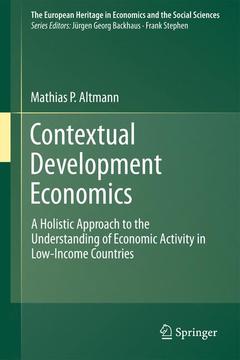Description
Contextual Development Economics, 2011
A Holistic Approach to the Understanding of Economic Activity in Low-Income Countries
The European Heritage in Economics and the Social Sciences Series, Vol. 8
Author: Altmann Matthias P.
Language: English
Subjects for Contextual Development Economics:
Approximative price 105.49 €
In Print (Delivery period: 15 days).
Add to cartPublication date: 12-2012
287 p. · 15.5x23.5 cm · Paperback
Approximative price 105.49 €
In Print (Delivery period: 15 days).
Add to cartPublication date: 12-2010
287 p. · 15.5x23.5 cm · Paperback
Description
/li>Contents
/li>Comment
/li>
Scrutinizes and advances development economics from a methodological standpoint
Sharpens the methods of development research in order to reach more policy-relevant and context-specific conclusions
Makes accessible to English-speaking scholars a body of literature previously tied to the German language
These books may interest you

Low Carbon DevelopmentKey Issues 61.25 €



